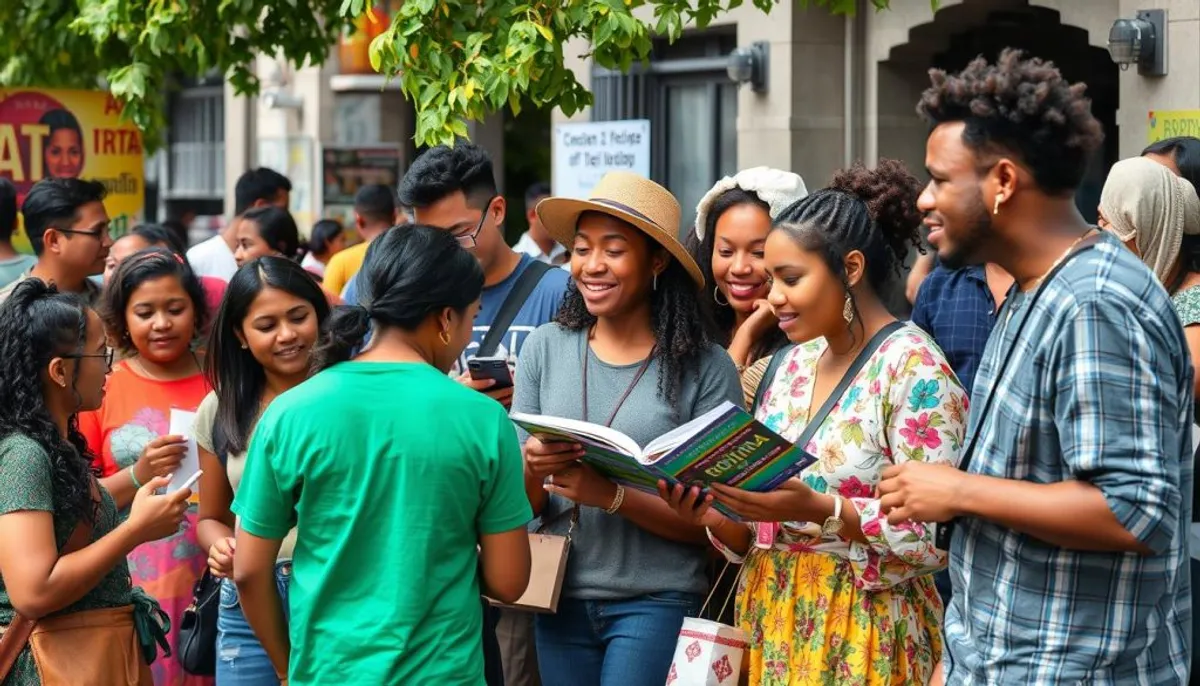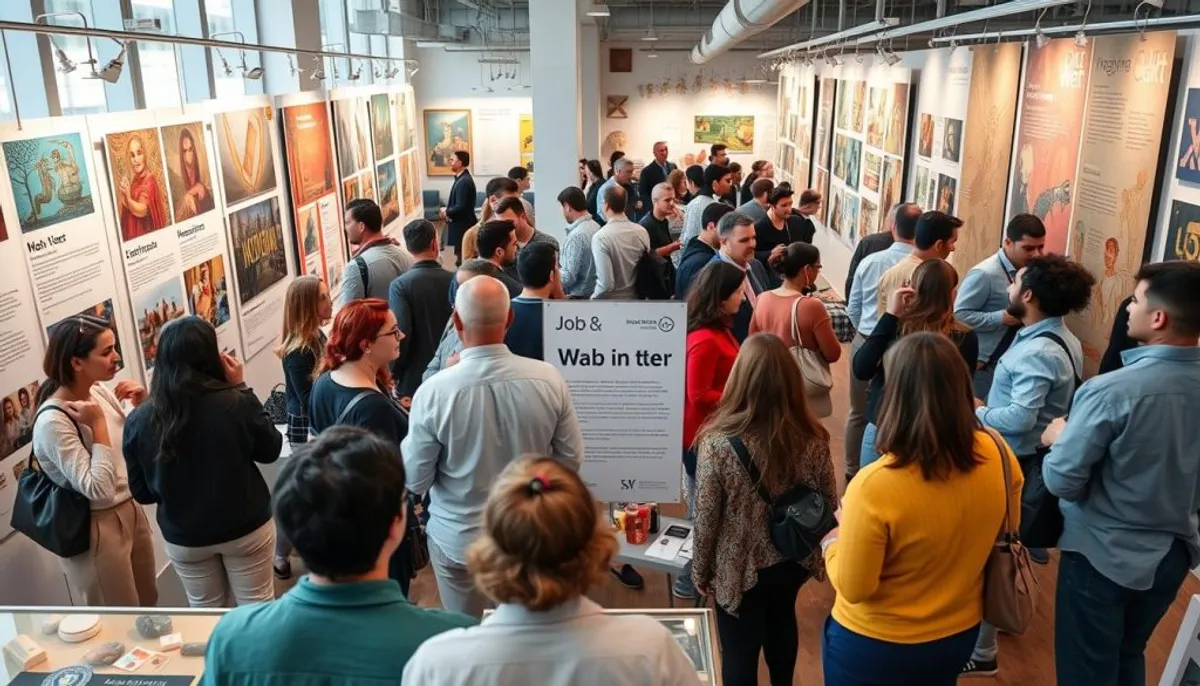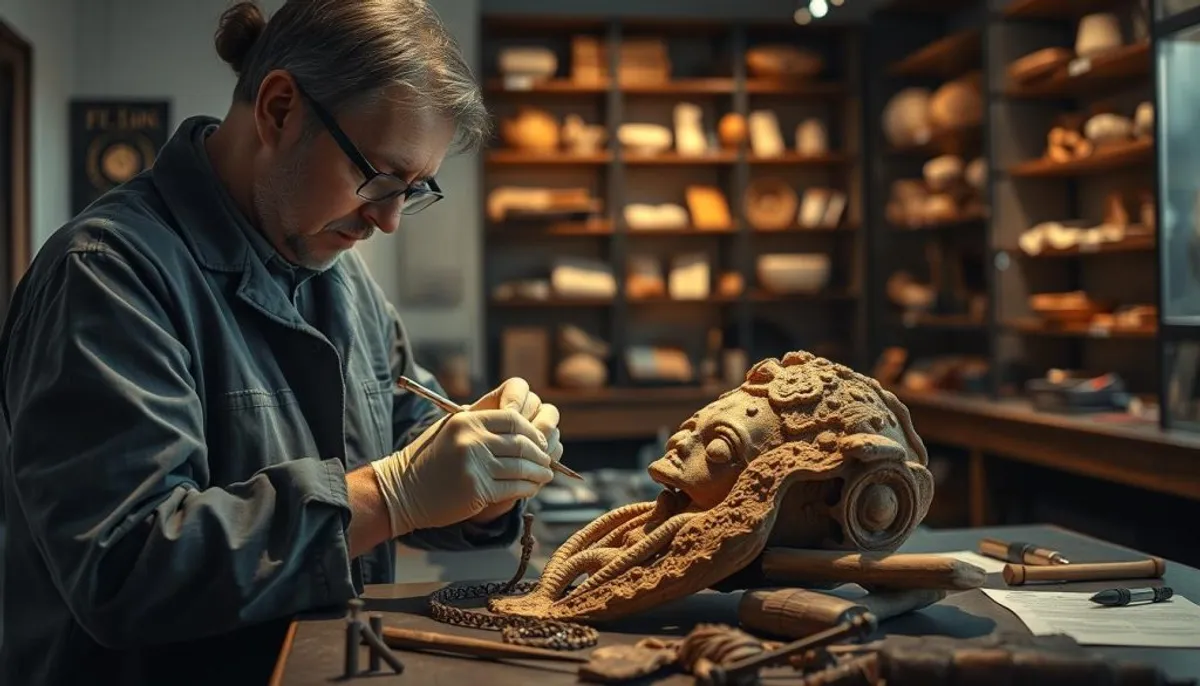Cultural mediation opens the door to multiple opportunities in a rapidly expanding sector. Emerging in the 1970s, this field has quickly established itself as a fundamental pillar of the French cultural landscape. It currently accounts for 2.7% of jobs in France, generating over 740,000 positions and approximately 2% of the national GDP.
Careers in culture are diverse, covering positions in the public service, private sector, and non-profit organizations. Cultural institutions, museums, theaters, and art centers offer interesting prospects for those aspiring to a career in this sector.

Whether you are drawn to heritage conservation, organizing cultural events, or cultural management, this guide will guide you. It will allow you to explore the various paths after training in cultural mediation. We will discuss the essential skills needed to thrive in this exciting field and additional training to accelerate your professional progression.
Professional Opportunities in the Cultural Sector
The cultural sector in France stands out for its diversity of professional opportunities. With over 10,000 museums and 43,000 national monuments, it constitutes a vast reservoir of jobs. The French invest significantly in cultural leisure, highlighting the importance of this field.

Jobs in the Territorial Public Service
Employment in the cultural public service plays a crucial role. The state and local authorities employ approximately 130,000 people in heritage. This sector encompasses museums, archives, and libraries. Positions generally require a high level of qualification, ranging from Bac+2 to Bac+5.
Positions in the Private and Non-Profit Sectors
The private sector offers various positions in the cultural field. It includes exhibition curators, project managers, and work managers. The private sector also values skills in commerce and web marketing to adapt to e-commerce.
Cultural Institutions and Their Needs
The needs of cultural institutions are diverse and constantly evolving. Museums, for example, need professionals for conservation, programming, and management. Cultural action is experiencing rapid growth, requiring experts capable of bringing culture to distant audiences.
| Sector | Number of Jobs | Examples of Positions |
|---|---|---|
| Public Service | 130,000 | Curator, Conservation Officer |
| Art Education | 50,000 | Art Teachers, Conservatory Professors |
| Private Sector | Variable | Exhibition Curator, Project Manager |
What to Do After Cultural Mediation: Possible Paths
Training in cultural mediation opens a wide range of opportunities in the cultural sector. Graduates can explore various fields, offering exciting and rewarding careers.
Heritage Conservation and Management
Considering a career in heritage conservation is an appealing option. Holders can occupy positions such as museum directors, collection managers, or conservators. These roles are essential for the preservation and enhancement of our cultural heritage, and it is important to understand the definition of culture to better appreciate these roles.

Organizing Cultural Events
Organizing cultural events represents a promising path. Positions as exhibition curators or exhibition project managers are particularly valued. These professionals create unique cultural experiences, captivating the audience.
Cultural Management
The field of managing cultural institutions is experiencing significant growth. Graduates can aim for leadership positions in associations, cultural venues, or local authorities. These roles require both artistic vision and management skills, and a deep understanding of consumer anthropology is also beneficial for understanding the social dynamics related to cultural practices.
| Field | Examples of Positions | Key Skills |
|---|---|---|
| Heritage Conservation | Museum Director, Conservator | Historical Expertise, Collection Management |
| Cultural Events | Exhibition Curator, Project Manager | Creativity, Project Management |
| Cultural Management | Association Director, Administrator | Leadership, Financial Management |
Key Skills for Advancement in the Cultural Sector
The cultural sector in France represents a vast array of professional opportunities. To thrive and progress in this field, it is essential to cultivate specific skills. Expertise in cultural mediation is a significant asset. However, other skills play a crucial role in ensuring career advancement in the cultural domain.
Project management proves to be a fundamental skill. Professionals in the cultural sector are frequently tasked with organizing events, exhibitions, or educational programs. A deep understanding of heritage and art is essential for interpreting and enhancing cultural works.
Communication skills play a crucial role in this sector. They allow for effectively conveying cultural messages to the public. Mastery of digital tools has become essential, particularly for promoting events and managing collections.
- Versatility
- Creativity
- Teamwork
- Adaptability
These qualities are highly valued in this constantly evolving field. Salaries vary depending on the position and experience. For example, a beginner cultural mediator can expect around 1800 euros gross per month. A junior cultural communication officer can reach around 2000 euros.
To access these positions, adequate training is imperative. A Bac+3 level is often required in the private sector, but some opt for a Bac+5 to access responsible positions more quickly. Specialized programs, such as a bachelor's in communication and event management, offer targeted training for the cultural sector.
Complementary Training and Specializations
Continuous training is crucial for progressing in cultural mediation, especially in a context of geopoetic space. Professionals have several options to refine their skills and specialize.
Specialized Masters
Specialized culture masters offer in-depth expertise. The Louvre School offers Master's programs to access various professions. Graduates can become cultural attachés, cultural business managers, or tour guides. These programs combine theory and practice, with 8 weeks of mandatory internships.
Professional Certifications
Heritage professional certifications allow for acquiring specific skills. They are essential for roles as museum curators or mediators between collections and audiences. These short courses are valued by employers for their ability to attest to targeted expertise.
Continuing Education
Continuing education in cultural mediation is essential to stay updated. Institutions like the National Institute of Heritage offer programs adapted to the sector's developments. These trainings allow for specialization in cultural engineering or audience development. They are designed for active professionals wishing to deepen their knowledge.
Whatever option is chosen, these complementary trainings are a major asset for evolving in the cultural sector. They allow for acquiring new skills and opening exciting career prospects.
Conclusion
The future of cultural mediation in France looks promising and rich in diversity. Since its emergence in the 1990s, this field has undergone constant evolution. It now offers multiple career prospects in the cultural sector. The 2002 Museum Law marked a turning point by recognizing the importance of cultural mediation, making it mandatory for every French museum to have dedicated services.
Professional development in the cultural field extends well beyond museums. Cultural mediators hold various positions, from public institutions to associations, as well as in the private sector. Their mission is essential for establishing bridges between works, artists, and the public. This makes art and culture accessible to all, thus fostering a deeper understanding of these fields.
To thrive in this evolving domain, it is crucial to develop skills and stay informed about the latest trends. Continuing education, professional certifications, and diverse experiences are valuable assets. They offer numerous opportunities for growth. The future of cultural mediation depends on professionals' ability to adapt, innovate, and continue creating deep connections between culture and the public.
RelatedRelated articles


